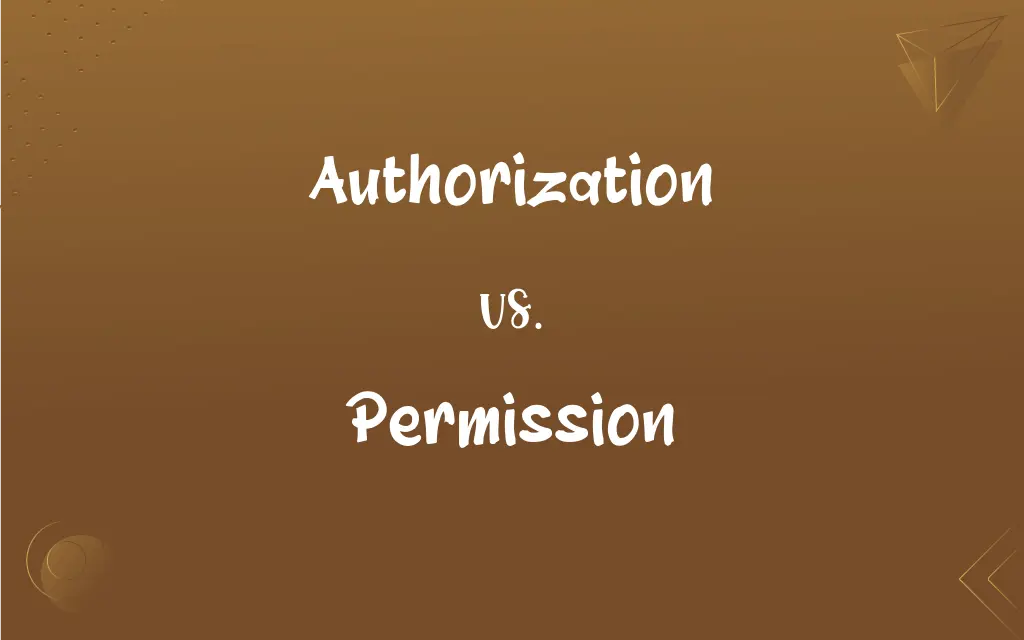Authorization vs. Permission: What's the Difference?
Edited by Harlon Moss || By Janet White || Updated on September 28, 2023
"Authorization is the formal approval to access or do something, while permission is the consent given, often informally, for a specific action."

Key Differences
Authorization typically carries a formal connotation, implying an official grant of access or rights, often backed by an established entity or system. In contrast, permission can be seen as a more general term, indicating an allowance or consent, often given by an individual or entity based on discretion.
In the realm of digital systems, authorization delineates what users can do after they've been authenticated, dictating their access level. Conversely, permission in such contexts often relates to the user's capability to perform actions like reading, writing, or deleting data.
Documents such as licenses or certificates often serve as tangible proofs of authorization. This means that a person has undergone certain assessments or met specific criteria to gain a particular status or right. On the other hand, permission might not always have a physical representation but can be verbally given or implied.
Authorization often requires a process or procedure, ensuring that rights are given to the correct entity and are justifiable. Permission, while it can be systematic, often leans towards being an informal grant, based on trust or personal judgment.
To summarize, while both authorization and permission deal with granting rights or access, the former is more formal and systematic, and the latter is generally more informal and based on discretion.
ADVERTISEMENT
Comparison Chart
Definition
Official approval or power to act
The act of allowing someone to do or have something
Formality
Typically formal
Can be both formal and informal
Context
Administrative, business, legal
General, any context
Weight
Has official or legal weight
Might or might not have official weight
Example
A passport serves as authorization to travel abroad.
Asking for permission to leave the table during dinner.
ADVERTISEMENT
Authorization and Permission Definitions
Authorization
The power or right to give orders or make decisions.
The committee has the authorization to make the final call.
Permission
A formal or verbal allowance.
She granted them permission to use her artwork.
Authorization
Official approval to do something.
She received authorization to access the restricted files.
Permission
The act of allowing or enabling.
The teacher gave her permission to go to the restroom.
Authorization
Validation or verification for a particular action.
Online transactions require credit card authorization.
Permission
Consent or approval to do something.
May I have your permission to leave early today?
Authorization
A document giving official permission.
His authorization card allowed him entry into the building.
Permission
The right or ability to enter, access, or use.
He was denied permission to enter the private event.
Authorization
Empowerment or permission from a higher authority.
The board's authorization was needed to proceed with the project.
Permission
An informal agreement or tolerance.
With your permission, I'll start the presentation.
Authorization
The act of authorizing.
Permission
The act of permitting, especially in giving formal consent; authorization
Do they have permission to leave?.
Authorization
Something that authorizes; a sanction.
Permission
An authorization to do something, as to quote from a book under copyright.
Authorization
(uncountable) Permission.
I've got authorization. Call the office and you'll see.
Permission
Authorisation; consent (especially formal consent from someone in authority)
Sire, do I have your permission to execute this traitor?
Authorization
(countable) An act of authorizing.
Permission
The act of permitting.
Authorization
(countable) (A document giving) formal sanction, permission or warrant.
Can I see your authorization?
Permission
(computing) Flags or access control lists pertaining to a file that dictate who can access it, and how.
I used the "chmod" command to change the file's permission.
Authorization
(government) Permission, possibly limited, to spend funds for a specific budgetary purpose.
We've had the authorization for years, but we've never gotten an appropriation.
Permission
(transitive) To grant or obtain authorization for.
Authorization
The act of giving authority or legal power; establishment by authority; sanction or warrant.
The authorization of laws.
A special authorization from the chief.
Permission
The act of permitting or allowing; formal consent; authorization; leave; license or liberty granted.
High permission of all-ruling Heaven.
You have given me your permission for this address.
Authorization
A document giving an official instruction or command
Permission
Approval to do something;
He asked permission to leave
Authorization
The power or right to give orders or make decisions;
He has the authority to issue warrants
Deputies are given authorization to make arrests
Permission
The act of giving a formal (usually written) authorization
Authorization
Official permission or approval;
Authority for the program was renewed several times
Authorization
The act of conferring legality or sanction or formal warrant
FAQs
Is asking for permission less official than seeking authorization?
Often, yes. Permission can be informal, while authorization tends to have a more official tone.
Does authorization always come from a higher authority?
Generally, authorization comes from an authoritative figure or institution, but context matters.
Can permission be given verbally?
Yes, permission can be both verbal and written.
Can a document serve as a form of authorization?
Yes, documents, like ID cards or certificates, can serve as forms of authorization.
Is authorization always a formal process?
Typically, authorization implies formality, but context can vary its strictness.
Can permission be assumed?
Assuming permission can lead to misunderstandings; it’s better to seek explicit permission.
Is there a difference between being authorized and being qualified?
Yes. Being authorized means having approval, while being qualified means having the necessary skills or knowledge.
Can authorization be withdrawn?
Yes, authorization can be revoked or modified depending on circumstances.
Does authorization always require documentation?
Not always, but documentation often accompanies formal authorization.
Can you give permission without having authority?
It’s possible, but such permission may not be valid or legally binding.
Do all permissions have legal implications?
Not necessarily. Permissions can be casual and not legally binding.
Can a child give permission, or does it have to be an adult?
Context matters. In many situations, adults or guardians grant permission on behalf of children.
Can someone have authorization but not use it?
Yes, having authorization doesn’t obligate one to use it.
Can permission imply consent?
Yes, permission is a form of consent.
Is electronic authorization as valid as written authorization?
Generally, electronic authorization is recognized as valid, but it depends on the context and applicable laws.
About Author
Written by
Janet WhiteJanet White has been an esteemed writer and blogger for Difference Wiki. Holding a Master's degree in Science and Medical Journalism from the prestigious Boston University, she has consistently demonstrated her expertise and passion for her field. When she's not immersed in her work, Janet relishes her time exercising, delving into a good book, and cherishing moments with friends and family.
Edited by
Harlon MossHarlon is a seasoned quality moderator and accomplished content writer for Difference Wiki. An alumnus of the prestigious University of California, he earned his degree in Computer Science. Leveraging his academic background, Harlon brings a meticulous and informed perspective to his work, ensuring content accuracy and excellence.































































